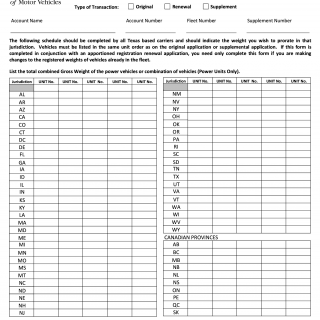Form MCD-357. Texas IRP Cab Card Weight Schedule
The MCD-357 form, also known as the Texas IRP Cab Card Weight Schedule, is a document used in the state of Texas for commercial vehicle registration purposes. Its main purpose is to provide information about the weight schedule for commercial vehicles registered under the International Registration Plan (IRP).
The form consists of various sections that capture essential details related to the vehicle's weight specifications. These sections may include fields for vehicle identification, such as VIN (Vehicle Identification Number), license plate number, make, model, and year. Additionally, it may require information regarding the vehicle's registered gross vehicle weight, axle weights, and other relevant weight-related details.
When filling out the form, it is important to accurately provide all the required data pertaining to the vehicle's weight information. The accuracy of this information is crucial as it affects the calculation of registration fees and ensures compliance with applicable regulations.
No specific additional documents are mentioned as requirements for completing the form. However, it is advisable to have supporting documentation readily available, such as vehicle registration documents, weight certificates, or any other relevant paperwork that verifies the accuracy of the weight information provided.
Application examples and use cases for this form include registering new commercial vehicles or renewing existing registrations under the Texas IRP. Commercial vehicle owners or operators must complete the form to comply with state regulations and obtain the necessary cab card that serves as proof of registration and weight information.
Strengths of the form include its role in ensuring proper registration and compliance with weight-related regulations, promoting road safety, and facilitating accurate assessment of registration fees based on a standardized weight schedule.
Weaknesses or challenges could arise if the form is not completed accurately or if there are errors or discrepancies in the weight information provided, leading to potential administrative complications or penalties.
Opportunities for improvement may involve providing clearer instructions or guidelines on how to complete the form and offering additional resources or support for commercial vehicle owners/operators to understand and comply with weight-related regulations.
As for threats, incorrect or fraudulent completion of the form could result in inaccurate registration data, potentially impacting safety on the roads and causing financial or legal consequences for the vehicle owner/operator.
Related forms or analogues may exist in other states or jurisdictions with their own specific requirements for commercial vehicle registration and weight information. While similarities may exist in the purpose and content of these forms, differences can arise due to variations in state-specific regulations or practices.
The completion of this form affects the future of the participants by ensuring that their commercial vehicles are properly registered and compliant with weight regulations. It allows for accurate assessment of registration fees and helps maintain safety standards on the road.
The form is typically submitted to the relevant state agency responsible for commercial vehicle registration, such as the Texas Department of Motor Vehicles (DMV). The specific submission process may vary, but it generally involves mailing or delivering the completed form along with any required fees or supporting documentation.
Once submitted, the form and associated records are typically stored in the state agency's databases or filing systems. This allows for easy retrieval and verification of registration details when needed for audits, inspections, or other administrative purposes.

